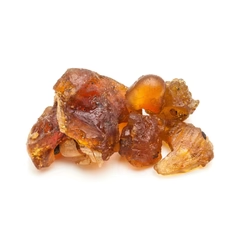
Guggul
Guggul is a flowering plant that belongs to the family of Burseraceae. It can be harvested in central Asia and northern Africa, but it is most commonly found in northern India. Guggul's scientific name is Commiphora Wightii and it also goes by the names gugul, guggulu, gugal, gugul, Mukul Myrrh Tree and Indian Bdellium Tree. The ideal climates for Guggul to grow in are semi-arid and arid climates, and it does well in areas that have poor soil. Guggul's features are that of a small shrub or tree that reaches the maximum height of four meters with a papery thin bark. The branches of Guggul are quite prickly, the leaves grow in clusters of three with jagged edges and range from 1 to 5 cm long and up to 2.5 cm wide. The flowers of Guggul are reddish in hue and have 4 petals each. The tiny fruits turn red when they are fully ripe.
Guggul is a key herbal ingredient in Ayurvedic healthcare, but it has become quite scarce due to being overharvested in its two habitats located in India. Guggul is known to produce a resinous sap that's called gum guggul and it has a range of beneficial health applications. It is known in Ayurveda as an herb with purifying qualities. It cleanses unhealthy tissues in the body, rejuvenates your skin and helps improve energy and stamina. Due to it's myriad health benefits, Guggul is often found as an ingredient in combination Ayurvedic formulas.




















